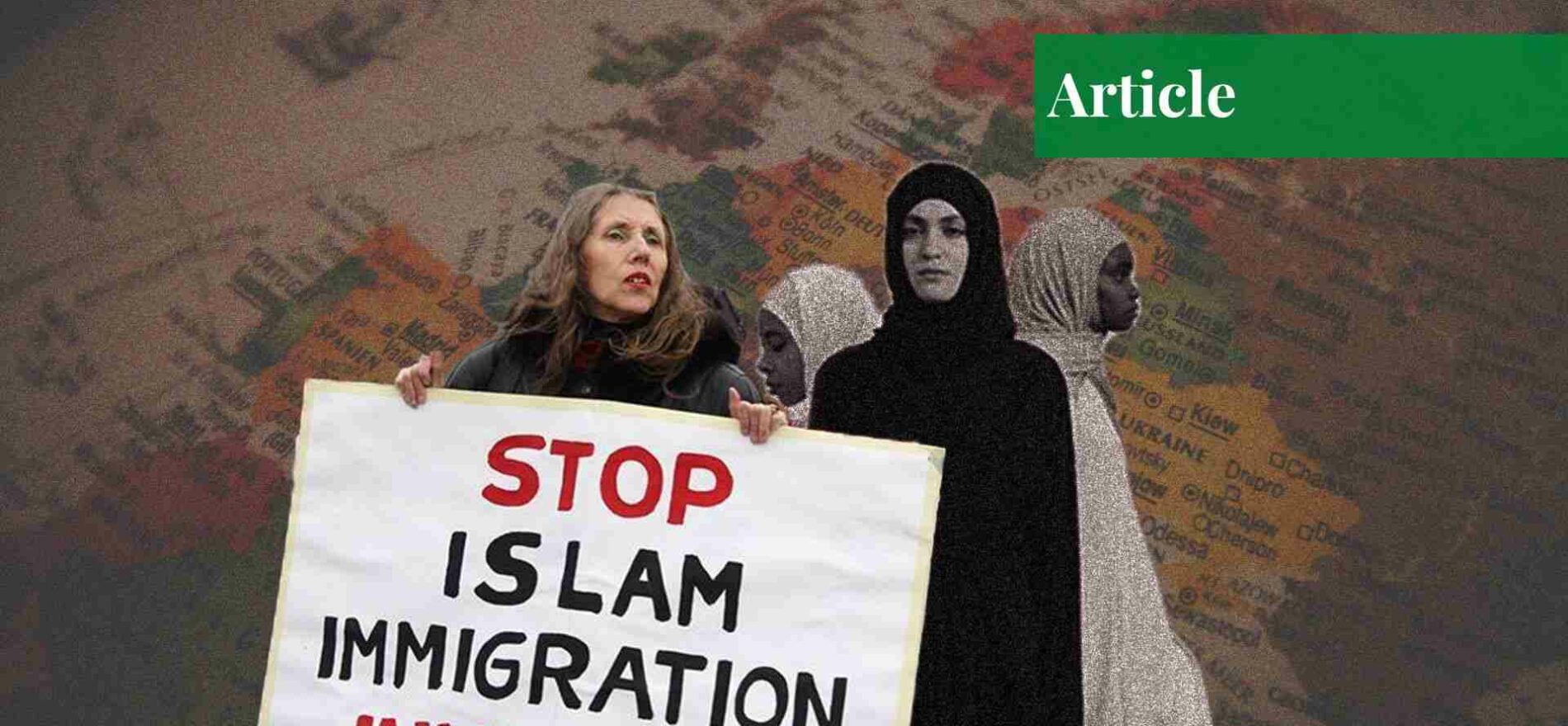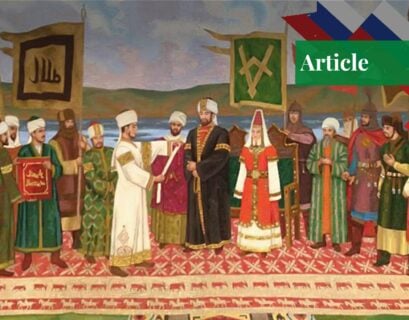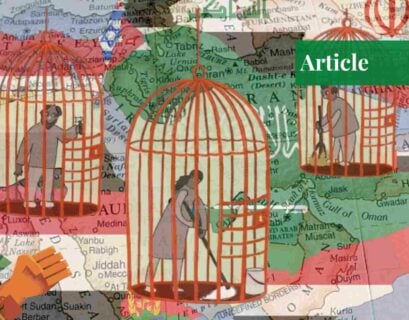Ms Fatimah Naeem is pursuing her Bachelor's in Peace and Conflict Studies from National Defence University Islamabad.
Introduction
The land of Europe is known as the epitome of modernism and acceptance, but lately, the claims seem to contradict the recent surge in anti-Muslim incidents in the region. However minute the phenomenon may be, tensions are escalating as cases depicting anti-Muslim or Islamophobic sentiments are rapidly increasing. The need to address this issue is of the utmost importance if societies are to prevail in peace and unity.
The increase in anti-Muslim hate crime cases amongst Europeans has been seemingly soaring for the last 30 years, but according to a report on Islamophobia in Europe released in 2018, only around 12% of these cases are reported to the authorities annually. Many speculations and assumptions suggest that the Western criterion was in search of a new combatant after the Cold War and just so happened to point its arrows at the immigrating Muslim lot. The majority of the European populace regards Islam and Muslims as hegemonic and authoritarian proponents that threaten the integrity of European liberalism.
As one mentions “anti-Muslim” or “Islamophobic” sentiments, the idea behind them is quite broad and wrongly depicts Muslims, whether they are fundamentalists or secular. In other words, these sentiments do not refer to simply criticizing a set of religious concepts but also include attitudes that dehumanize and generalize an entire population group.
The Decline of Europe’s Multiculturalism
The deadly aftermath of the two world wars left a lasting impression on the conflictual behavior of Europe. New schemes of amalgamation were invented, where fraternization as a prospect of peace and stability was encouraged. The advent of the European Union was a hopeful sign of globalization and acceptance throughout the region, as it went from having six participants initially to twenty-seven later on – a remarkable result for the cross-border peace experiment, categorized as “multiculturalism,” indeed.
Unfortunately, in recent years, the phenomenon of multiculturalism has taken some blows as European politicians and leaders demand a complete cessation of the term from national and international policies. Many European leaders blame the increasing terrorism in Muslim-dominant countries for the terms’ removal, which ultimately threatens the aspect of cultural variety and safety in the European region as well.
Escalation of Islamophobic Rhetoric
The Gulf War was a prominent catalyst for infusing prejudice and hostility towards Muslims in Europe but the devastating events of 9/11 that followed in 2001 further fueled discriminatory sentiments against them. Unfortunately, the War on Terror was observed to be another method of including all Muslims as enemies of peace as well as producing skeptical remarks about them in the mainstream media, rather than only highlighting the radicalized front.
A noteworthy episode was Turkey’s longing for EU membership, which lasted for more than a decade. Many countries opposed the idea of a Muslim country joining the EU by commenting that Islam and Europe are two incompatible prospects and that the religion itself has inherently no place in the region, even though European history speaks for itself, displaying that Muslims have reigned and lived in the zone for hundreds of years.
Moreover, the Syrian conflict resulted in an influx of migrants seeking refuge from the harsh environment of their home country and finding their haven amongst Europeans who had already started to build hostile sentiments against their Muslim background. The 2016 New Year’s Eve attacks in the city of Cologne in Germany sparked a magnitude of intense media debates since most of the perpetrators in the attacks were Muslim men. Trying to paint all Muslims from a negative perspective, the fact that some Muslims are extremists and commit terrorist activities is used to foster the belief that Islam, in general, poses a threat that ultimately brings intolerance against all Muslims.
Terrorist incidents, mass attacks, the growing proportion of Muslim men in rape statistics, women’s persecution, and the fundamentalist practice of Sharia law are all used to paint Islam as a threat in general. With hate crimes against Muslims increasing day by day, major European countries such as France, Germany, and the UK have reported the most cases. In 2019 reports, a French organization, the Collectif Contre I’Islamophobie en France (CCIF), received 789 report forms referring to 1,043 incidents of hate crimes against Muslims.
Germany followed, shy of just a few cases, with 871 hate crimes reported to the police. The United Kingdom, however, is “crowned” with the most number of cases reported, a whopping 3,530 incidents. It is safe to assume that the rough patches in Britain’s colonial history with Muslim leaders and the immense support for Brexit played a supporting role in the rise of these incidents in recent years.
Conceptualization of “Eurabia” and Stealth Islamization
The alarming growth of support for theorists that conspire against Islam and Muslims in Europe is a troubling factor indeed. Many theorists have introduced concepts such as “stealth Islamization” and “Eurabia” which imply the steady and gradual infiltration of Islam in Europe, ultimately eroding the secular and Christian principles that the European societies were founded on. This is perceived as a major threat by many moderates and extremists alike.
Italy’s minister of interior, Matteo Salvini, leader of the far-right League, declared that nowadays Islam is a danger and that his future government would put a stop to the irregular Islamic presence. Similarly, moderates around Europe view Islam as particularly oppressive towards women and homosexuals. Moreover, the trepidations mostly include concepts such as demographic warfare, where Muslims who are known for their preferences for larger families, will outnumber the white population in the coming years.
The “Eurabia” theory, however, particularly concludes that Muslims are implementing a secret scheme where they eventually take up power in Europe. Unfortunate events unfolded in July 2011, in Norway, when a terrorist attack left 77 individuals murdered by a man named Breivik. The terrorist who carried out the attack was a hardcore believer in the “Eurabia” conspiracy theory and had blamed his unethical actions on the supposed threat Muslims pose to the Europeans. The attacker appeared to have seen the Norwegian Labor Party (Arbeiderpartiet) as representing the elite in Norway, and he was certain they were assisting Muslims in taking over Norway.
Exploiting “Free Speech” to Fuel Anti-Muslim Prejudice
Free speech and freedom of expression are the most emphasized spectacles in Europe. With many benefits, there also comes exploitation and abuse of the terms whether it is done through actions or words. Similarly, an incident took place this year in Stockholm, Sweden in January where Rasmus Paludan, an ultranationalist, and far-right extremist politician took the liberty of burning a copy of the Qur’an, Islam’s Holy Book, in front of the Turkish Embassy.
The act itself was condemned by many Muslim leaders but the ignorant and irresponsible conduct of the Swedish authorities in countering Rasmus’s behavior was even more questionable. Many Muslims considered this a blatant hate crime and demanded accountability for Rasmus. Even though Paludan was later arrested by the Swedish authorities for “incitement against a group of people, insult and gross assault against an official,” his status and influence still exhibit an impactful message that will ultimately compromise the tolerance and unity among the European-Muslim world.
It is important to understand that freedom of expression and freedom to hold demonstrations, like many other rights and freedoms in modern democracies, are not boundless. These liberties may not be exercised in such a way that compromises the rights of others or public order. No justifications can be found when it comes to hate crimes and attacks against particular nations, states, or religions. Moreover, in Norway, the burning of the Quran has been legalized because it is considered to be a statement of an ideology that falls under the category of “freedom of speech.”
Freedom of expression is a human right and a vital component of Norwegian democracy and for the same reason prejudice and demonstration of hatred towards systems and ideas, particularly Islam or religious symbols, are considered within the boundaries of the Norwegian constitution. However, it is prohibited in Norway to express hatred towards an “individual” because of their ethnicity, skin color, or “religious views” whether those views go against the religion or in favor of it.
EU’s Initiatives to Combat Islamophobic Sentiments
To dismantle the continuously growing discrimination against Muslims in Europe, many parliamentarians have suggested that the European Commission establish an EU coordinator to look after and combat the anti-Muslim hatred across the region. On top of that, according to the 14th Annual Report on Islamophobia released by the Organization of Islamic Cooperation (OIC), an unfortunate surge in anti-Muslim sentiments was observed throughout Europe. The majority of anti-Muslim bigotry and incidents in the EU were documented in France, which, together with Germany, has the biggest number of European Muslims.
Furthermore, across Europe, governments have started programs to eradicate Islamophobic sentiments and foster social inclusion. These initiatives frequently include funding for educational programs, interfaith dialogues, and community outreach projects aimed at increasing the understanding and respect among various religious and cultural groupings. Non-governmental organizations (NGOs) and other associated groups have also launched public awareness campaigns to combat misconceptions, promote tolerance, and oppose anti-Islamic myths.
Conclusion
The increasing tensions among European Muslims and their other religious counterparts seem to be shifting the focus from inclusivity and amalgamation to intolerance. A call-out for international attention is the most necessary step in terminating the prevailing anti-Muslim disinclination in Europe. The issue seems to be multifaceted as Europe’s withering multiculturalism and firm belief in anti-Islam conspiracy theories have fostered hateful sentiments against Muslims in Europe.
Moreover, exploiting “freedom of speech” by participation in offensive demonstrations towards sacred spectacles of Islam, unfortunately, prevails. A concrete body, appointed by each member state of the European Union to tackle anti-Muslim hate in their respective countries, would be a favorable drive to combat this issue. Till then, bringing awareness to the mass consciousness regarding this issue would prove advantageous for the future of religious inclusivity around the globe.
If you want to submit your articles, research papers, and book reviews, please check the Submissions page.
The views and opinions expressed in this article/paper are the author’s own and do not necessarily reflect the editorial position of Paradigm Shift.



















